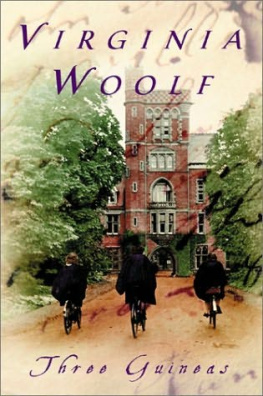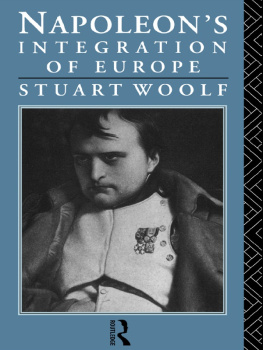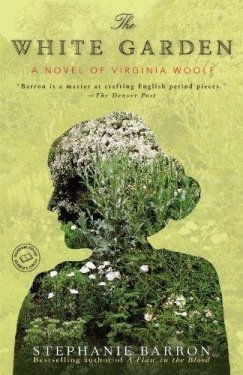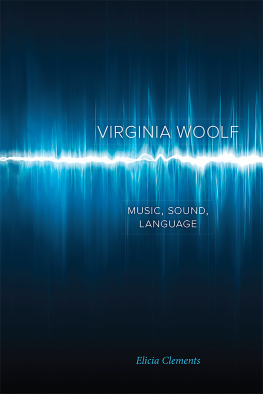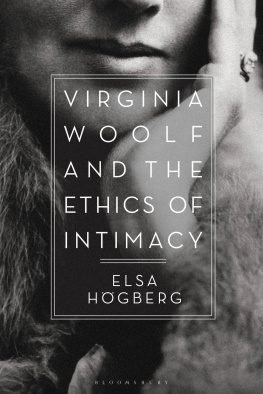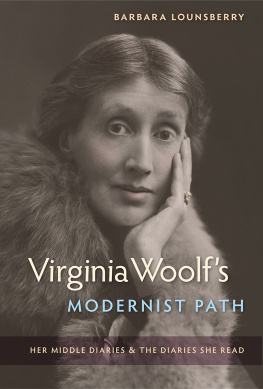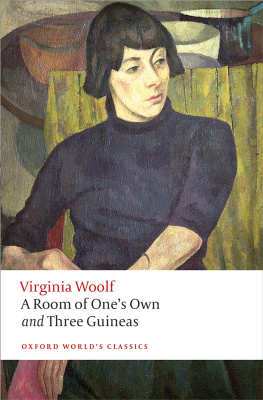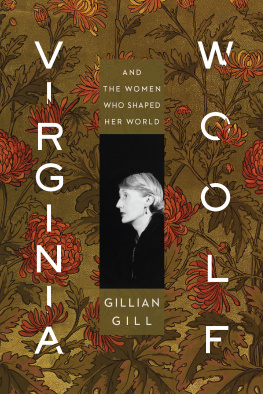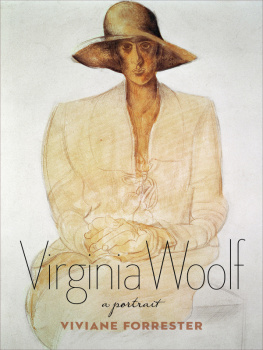Woolf - Three Guineas
Here you can read online Woolf - Three Guineas full text of the book (entire story) in english for free. Download pdf and epub, get meaning, cover and reviews about this ebook. year: 1939, publisher: Project Gutenberg, genre: Romance novel. Description of the work, (preface) as well as reviews are available. Best literature library LitArk.com created for fans of good reading and offers a wide selection of genres:
Romance novel
Science fiction
Adventure
Detective
Science
History
Home and family
Prose
Art
Politics
Computer
Non-fiction
Religion
Business
Children
Humor
Choose a favorite category and find really read worthwhile books. Enjoy immersion in the world of imagination, feel the emotions of the characters or learn something new for yourself, make an fascinating discovery.
- Book:Three Guineas
- Author:
- Publisher:Project Gutenberg
- Genre:
- Year:1939
- Rating:5 / 5
- Favourites:Add to favourites
- Your mark:
- 100
- 1
- 2
- 3
- 4
- 5
Three Guineas: summary, description and annotation
We offer to read an annotation, description, summary or preface (depends on what the author of the book "Three Guineas" wrote himself). If you haven't found the necessary information about the book — write in the comments, we will try to find it.
The highly controversial Three Guineas was Virginia Woolfs most
explicit statement of her feminism. Forming part of the Shakespeare
Head Press series of Woolfs works, this new edition includes her
carefully considered selection of photographs, her discursive endnotes
and extensive new annotations of her references and allusions.
Three Guineas — read online for free the complete book (whole text) full work
Below is the text of the book, divided by pages. System saving the place of the last page read, allows you to conveniently read the book "Three Guineas" online for free, without having to search again every time where you left off. Put a bookmark, and you can go to the page where you finished reading at any time.
Font size:
Interval:
Bookmark:
Three years is a long time to leave a letter unanswered, and your letter has been lying without an answer even longer than that. I had hoped that it would answer itself, or that other people would answer it for me. But there it is with its question--How in your opinion are we to prevent war?--still unanswered.
It is true that many answers have suggested themselves, but none that would not need explanation, and explanations take time. In this case, too, there are reasons why it is particularly difficult to avoid misunderstanding. A whole page could be filled with excuses and apologies; declarations of unfitness, incompetence, lack of knowledge, and experience: and they would be true. But even when they were said there would still remain some difficulties so fundamental that it may well prove impossible for you to understand or for us to explain. But one does not like to leave so remarkable a letter as yours--a letter perhaps unique in the history of human correspondence, since when before has an educated man asked a woman how in her opinion war can be prevented?--unanswered. Therefore let us make the attempt; even if it is doomed to failure.
In the first place let us draw what all letter-writers instinctively draw, a sketch of the person to whom the letter is addressed. Without someone warm and breathing on the other side of the page, letters are worthless. You, then, who ask the question, are a little grey on the temples; the hair is no longer thick on the top of your head. You have reached the middle years of life not without effort, at the Bar; but on the whole your journey has been prosperous. There is nothing parched, mean or dissatisfied in your expression. And without wishing to flatter you, your prosperity--wife, children, house--has been deserved. You have never sunk into the contented apathy of middle life, for, as your letter from an office in the heart of London shows, instead of turning on your pillow and prodding your pigs, pruning your pear trees--you have a few acres in Norfolk--you are writing letters, attending meetings, presiding over this and that, asking questions, with the sound of the guns in your ears. For the rest, you began your education at one of the great public schools and finished it at the university.
It is now that the first difficulty of communication between us appears. Let us rapidly indicate the reason. We both come of what, in this hybrid age when, though birth is mixed, classes still remain fixed, it is convenient to call the educated class. When we meet in the flesh we speak with the same accent; use knives and forks in the same way; expect maids to cook dinner and wash up after dinner; and can talk during dinner without much difficulty about politics and people; war and peace; barbarism and civilization--all the questions indeed suggested by your letter. Moreover, we both earn our livings. But... those three dots mark a precipice, a gulf so deeply cut between us that for three years and more I have been sitting on my side of it wondering whether it is any use to try to speak across it. Let us then ask someone else--it is Mary Kingsley--to speak for us. 'I don't know if I ever revealed to you the fact that being allowed to learn German was all the paid-for education I ever had. Two thousand pounds was spent on my brother's, I still hope not in vain.'1 Mary Kingsley is not speaking for herself alone; she is speaking, still, for many of the daughters of educated men. And she is not merely speaking for them; she is also pointing to a very important fact about them, a fact that must profoundly influence all that follows: the fact of Arthur's Education Fund. You, who have read Pendennis, will remember how the mysterious letters A.E.F. figured in the household ledgers. Ever since the thirteenth century English families have been paying money into that account. From the Pastons to the Pendennises, all educated families from the thirteenth century to the present moment have paid money into that account. It is a voracious receptacle. Where there were many sons to educate it required a great effort on the part of the family to keep it full. For your education was not merely in book-learning; games educated your body; friends taught you more than books or games. Talk with them broadened your outlook and enriched your mind. In the holidays you travelled; acquired a taste for art; a knowledge of foreign politics; and then, before you could earn your own living, your father made you an allowance upon which it was possible for you to live while you learnt the profession which now entitles you to add the letters K.C. to your name. All this came out of Arthur's Education Fund. And to this your sisters, as Mary Kingsley indicates, made their contribution. Not only did their own education, save for such small sums as paid the German teacher, go into it; but many of those luxuries and trimmings which are, after all, an essential part of education--travel, society, solitude, a lodging apart from the family house--they were paid into it too. It was a voracious receptacle, a solid fact--Arthur's Education Fund--a fact so solid indeed that it cast a shadow over the entire landscape. And the result is that though we look at the same things, we see them differently. What is that congregation of buildings there, with a semi-monastic look, with chapels and halls and green playing-fields? To you it is your old school; Eton or Harrow; your old university, Oxford or Cambridge; the source of memories and of traditions innumerable. But to us, who see it through the shadow of Arthur's Education Fund, it is a schoolroom table; an omnibus going to a class; a little woman with a red nose who is not well educated herself but has an invalid mother to support; an allowance of 50 a year with which to buy clothes, give presents and take journeys on coming to maturity. Such is the effect that Arthur's Education Fund has had upon us. So magically does it change the landscape that the noble courts and quadrangles of Oxford and Cambridge often appear to educated men's daughters2 like petticoats with holes in them, cold legs of mutton, and the boat train starting for abroad while the guard slams the door in their faces.
The fact that Arthur's Education Fund changes the landscape--the halls, the playing grounds, the sacred edifices--is an important one; but that aspect must be left for future discussion. Here we are only concerned with the obvious fact, when it comes to considering this important question--how we are to help you prevent war--that education makes a difference. Some knowledge of politics, of international relations of economics, is obviously necessary in order to understand the causes which lead to war. Philosophy, theology even, might come in usefully. Now you the uneducated, you with an untrained mind, could not possibly deal with such questions satisfactorily. War, as the result of impersonal forces, is you will agree beyond the grasp of the untrained mind. But war as the result of human nature is another thing. Had you not believed that human nature, the reasons, the emotions of the ordinary man and woman, lead to war, you would not have written asking for our help. You must have argued, men and women, here and now, are able to exert their wills; they are not pawns and puppets dancing on a string held by invisible hands. They can act, and think for themselves. Perhaps even they can influence other people's thoughts and actions. Some such reasoning must have led you to apply to us; and with justification. For happily there is one branch of education which comes under the heading 'unpaid-for education'--that understanding of human beings and their motives which, if the word is rid of its scientific associations, might be called psychology. Marriage, the one great profession open to our class since the dawn of time until the year 1919; marriage, the art of choosing the human being with whom to live life successfully, should have taught us some skill in that. But here again another difficulty confronts us. For though many instincts are held more or less in common by both sexes, to fight has always been the man's habit, not the woman's. Law and practice have developed that difference, whether innate or accidental. Scarcely a human being in the course of history has fallen to a woman's rifle; the vast majority of birds and beasts have been killed by you, not by us; and it is difficult to judge what we do not share.3
Font size:
Interval:
Bookmark:
Similar books «Three Guineas»
Look at similar books to Three Guineas. We have selected literature similar in name and meaning in the hope of providing readers with more options to find new, interesting, not yet read works.
Discussion, reviews of the book Three Guineas and just readers' own opinions. Leave your comments, write what you think about the work, its meaning or the main characters. Specify what exactly you liked and what you didn't like, and why you think so.

